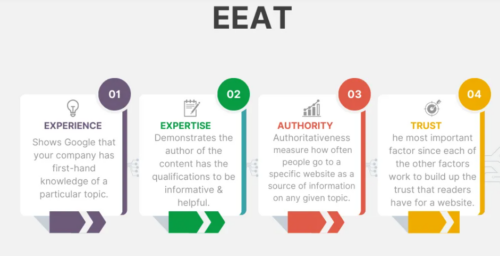Is There a Link Between Brand Search and E-E-A-T
 In recent years, Google has been placing more emphasis on E-E-A-T (Expertise, Authoritativeness, Trustworthiness, and Experience) as a ranking factor for websites. At the same time, there has been a growing interest in the relationship between E-E-A-T and brand search. In this blog post, we will explore the connection between these two concepts.
In recent years, Google has been placing more emphasis on E-E-A-T (Expertise, Authoritativeness, Trustworthiness, and Experience) as a ranking factor for websites. At the same time, there has been a growing interest in the relationship between E-E-A-T and brand search. In this blog post, we will explore the connection between these two concepts.
So, what is E-E-A-T?
E-E-A-T is a set of guidelines that Google uses to evaluate the quality of content on a website. The four components of E-E-A-T are:
Expertise: The content should be written by someone who has expertise in the subject matter.
Authoritativeness: The website should be authoritative and trustworthy.
Trustworthiness: The website should be trustworthy and have a good reputation.
Experience: The content should be created with firsthand experience of the topic.

What is Brand Search?
Brand search refers to the number of times people search for a particular brand name on Google. It is an important metric for businesses, as it indicates how well-known and popular their brand is.
The Significance of Brand Search
Brand search refers to the instances when users specifically search for a brand or its related products and services. This is a key metric that search engines use to gauge the popularity, relevance, and trustworthiness of a brand. When users actively seek out a brand, it indicates a level of familiarity and trust, which aligns with the principles of E-E-A-T.
The Link Between Brand Search and E-E-A-T
Formerly recognized as EAT, the inclusion of an additional “E” in the acronym signifies a notable transformation in Google’s approach to evaluating webpage content. Although this adjustment presently doesn’t alter Google’s page rankings, it provides insight into potential shifts in how the search engine might assess and rank web pages in the imminent future.
There is evidence to suggest that there is a link between brand search and E-E-A-T. One study found that websites with high levels of brand search tended to rank higher in Google search results . This suggests that Google may view brand search as an indicator of a website’s authority and trustworthiness.
Another study found that websites with high levels of brand search tended to have higher levels of E-E-A-T. This suggests that there may be a correlation between brand search and the four components of E-E-A-T.
Practical Implications for Businesses
Understanding the correlation between brand search and E-E-A-T offers valuable insights for optimizing online presence:
Cultivate a Strong Brand Identity:
Invest in creating a distinct and trustworthy brand identity that resonates with your target audience.
Prioritize High-Quality Content:
Develop authoritative, high-quality content that showcases your expertise in the industry. This can include blog posts, articles, whitepapers, and other relevant content.
Enhance User Experience:
Prioritize a positive user experience to build trust and satisfaction. This includes providing excellent customer service, ensuring a user-friendly website, and addressing user queries promptly.
Proactively Manage Online Reputation:
Actively monitor and manage your online reputation. Respond to customer reviews, address concerns, and work to maintain a positive brand image.
Why Does Google Care About EEAT?
Google implemented its original E-A-T principles to compensate websites that are providing users with useful and accurate content while also protecting them from incorrect, negative, or even harmful sites. While the new E-E-A-T policy does not currently affect your search ranking, Google will learn from this process and may update its search rankings based on the results in the future. That’s why it’s imperative to understand and execute the E-E-A-T principles on your site as soon as you can.
Another cause that Google is now prioritizing E-E-A-T is the increase in AI-generated content. While AI writing tools are helpful for quickly releasing content, AI-generated content is often inaccurate, outdated, or even harmful.
If a user is searching for medical information, then it’s important to share up-to-date and accessible content since inaccurate content could harm the user. Since AI writing tools aren’t advanced enough to demonstrate things like experience, expertise, authoritativeness, and trustworthiness, Google is likely using E-E-A-T to combat the rise of AI-generated content on their search engine.
In Conclusion
While there is no definitive proof that brand search is a direct ranking factor for Google, there is evidence to suggest that there is a link between brand search and E-E-A-T. Businesses that want to improve their search engine rankings should focus on building their brand and establishing themselves as experts in their field.
Sources
https://www.clickready.com/what-is-eeat
https://neilpatel.com/blog/what-is-e-e-a-t/
https://moz.com/learn/seo/google-eat


